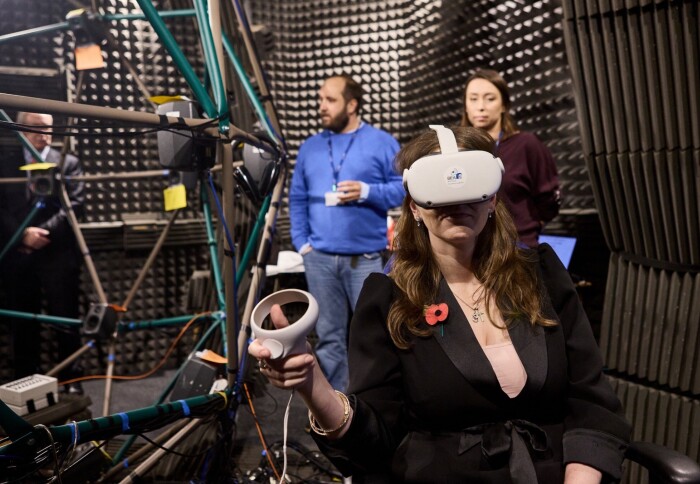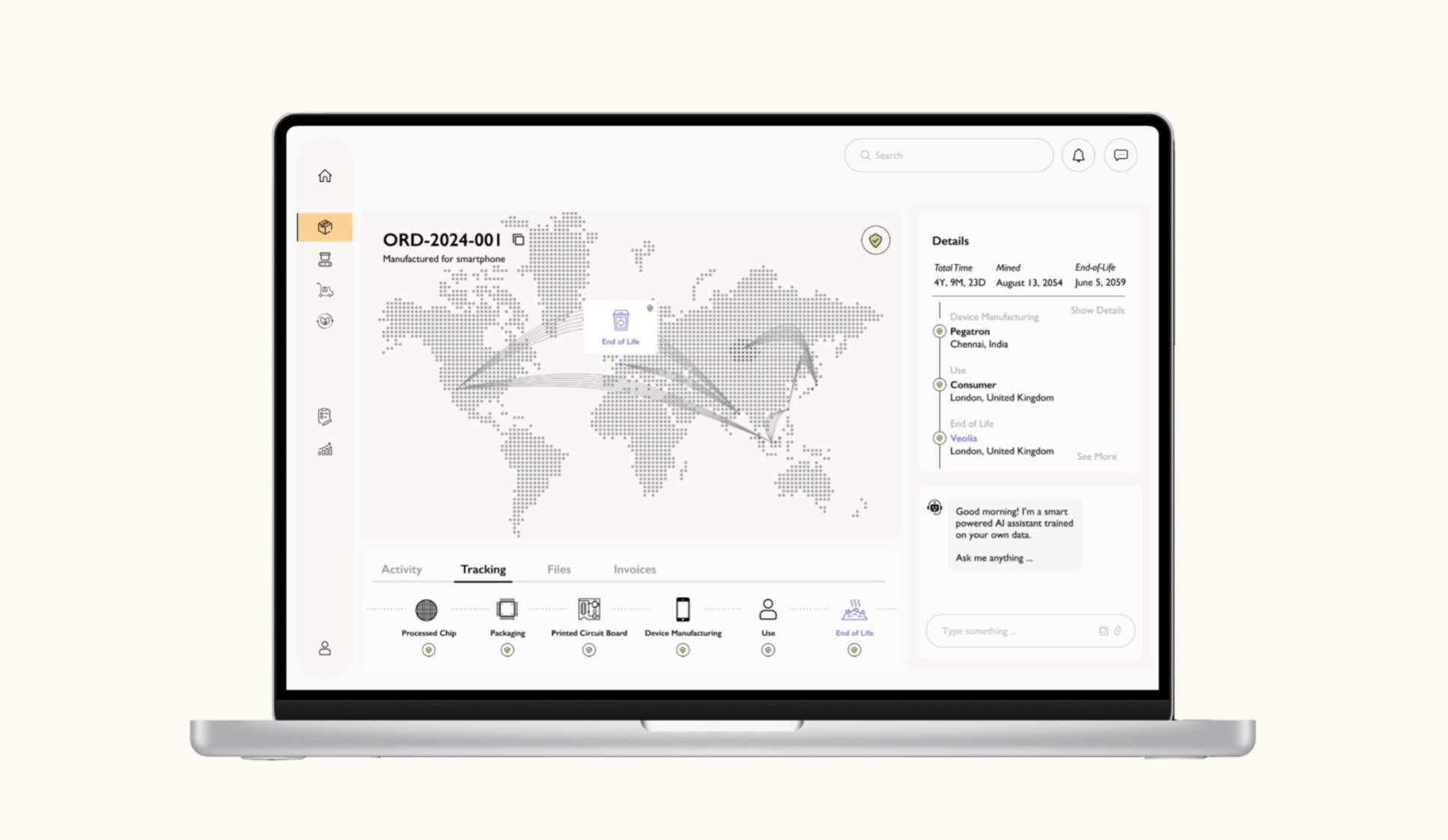Design Engineering projects celebrated on the global stage at DIA 2024

Design Engineering students and alumni were honoured at the 2024 Design Intelligence Awards for their impactful innovations across various categories.
From life-saving diagnostics to sustainable supply chains and virtual reality health training, projects from the Dyson School of Design Engineering, Imperial College London, made a powerful impression at the Design Intelligence Award (DIA) 2024, the world’s largest international industrial design award. With over 8,000 entries submitted globally, four student-led projects were recognised across award tiers demonstrating the department's strengths in creativity, engineering rigour, and real-world impact.
Among them, OriPill was honoured with the prestigious DIA Young Talents Award, placing it among the top 39 projects globally. Three additional projects received DIA Honourable Mention awards, celebrating innovation in healthcare, accessibility, sustainability, and digital industry.
Origami capsule brings precision to early-stage bowel cancer screening
 OriPill is an origami-inspired capsule endoscope designed by Yukun Ge (now a third-year PhD student at the Dyson School of Design Engineering’s Morph Lab), to detect early-stage colon cancer using tactile sensors and intelligent algorithms.
OriPill is an origami-inspired capsule endoscope designed by Yukun Ge (now a third-year PhD student at the Dyson School of Design Engineering’s Morph Lab), to detect early-stage colon cancer using tactile sensors and intelligent algorithms.
 OriPill employs a unique biomimetic origami structure, inspired by wheat spikes, allowing passive forward and reverse movement powered by intestinal peristalsis. A micro-actuator controls the origami shape, enabling precise positioning with minimal power. The capsule’s tactile sensors detect abnormal tissue hardness that signals early-stage bowel cancer and its algorithms estimate tumour size to support diagnosis.
OriPill employs a unique biomimetic origami structure, inspired by wheat spikes, allowing passive forward and reverse movement powered by intestinal peristalsis. A micro-actuator controls the origami shape, enabling precise positioning with minimal power. The capsule’s tactile sensors detect abnormal tissue hardness that signals early-stage bowel cancer and its algorithms estimate tumour size to support diagnosis.
By reducing capsule size and eliminating the need for specialised equipment or operators, OriPill offers a more comfortable, efficient, and patient-friendly screening tool.
This event served as an excellent platform for me to learn about cutting-edge trends in industry and market directions, such as smart healthcare, AI, and robotics. Yukun Ge PhD student, Dyson School of Design Engineering
“I am honoured that OriPill has received the Young Talents Award at this year’s DIA,” said Yukun Ge. “Although I am currently in academia, everything I saw and experienced at DIA has given me new insights into my research direction, inspiring me to refine and update my ideas for the next steps in my work.”
Professor Thrishantha Nanayakkara, founding leader of the DE Robotics Morph Lab, added:
“We try to understand the principles behind real-time conditioning of the physical body to improve both perception and action. Our soft robotics approach allows us to understand principles applicable to biological beings and also helps us build useful soft robots.”
Immersive VR gaming supports hearing development for cochlear implant users
 BEARS Training Games, developed by Professor Lorenzo Picinali and the Audio Experience Design team received an Honourable Mention at the 2024 Design Intelligence Awards. This innovative project uses virtual reality to deliver spatial hearing training for teenage cochlear implant users. It provides a playful but research-led environment that supports the development of spatial hearing skills by leveraging auditory plasticity.
BEARS Training Games, developed by Professor Lorenzo Picinali and the Audio Experience Design team received an Honourable Mention at the 2024 Design Intelligence Awards. This innovative project uses virtual reality to deliver spatial hearing training for teenage cochlear implant users. It provides a playful but research-led environment that supports the development of spatial hearing skills by leveraging auditory plasticity.
The VR-based games focus on skills including sound source localisation, speech-in-noise perception, and music listening. By embedding these tasks into interactive play, the project supports better long-term outcomes for bilateral cochlear implantees, making auditory training both engaging and effective.
Chip-level traceability for a circular and sustainable semiconductor industry
 Ubiroot, submitted by Global Innovation Design (GID) alumni Sabrina Tian, also received an Honourable Mention at the 2024 Design Intelligence Awards. The project introduces a traceability solution to tackle inefficiencies and e-waste in the global semiconductor industry. It uses nano-sized tags and an AI-powered digital twin to enable real-time tracking and accountability across a chip’s entire lifecycle—from raw material to end-of-life.
Ubiroot, submitted by Global Innovation Design (GID) alumni Sabrina Tian, also received an Honourable Mention at the 2024 Design Intelligence Awards. The project introduces a traceability solution to tackle inefficiencies and e-waste in the global semiconductor industry. It uses nano-sized tags and an AI-powered digital twin to enable real-time tracking and accountability across a chip’s entire lifecycle—from raw material to end-of-life.
By addressing the $75 billion faulty chip market, Ubiroot aims to reduce e-waste, ensure supply chain transparency, and support the transition toward circular manufacturing systems.
Ubiroot provides seamless traceability and real-time monitoring throughout the chip’s lifecycle. Sabrina Tian Global Innovation Design (GID), Dyson School of Design Engineering 2024 alumni
“Being featured at the prestigious 2024 Design Intelligence Awards underscored Ubiroot’s potential to transform global supply chains through innovation and sustainability. The recognition brought invaluable exposure and validation, connecting the project with international audiences,” said Sabrina Tian.
Ubiroot was also selected for exhibition at Asia Design Week 2024.

Remote dental check-ups for accessible oral health
 Arcus, developed by Design Engineering (MEng) alumni Emmeline Bolton, Rojeanne Stoffer, Thomas Kingan, and Eva Brazier, is another standout project from the Dyson School of Design Engineering to receive an Honourable Mention at the 2024 Design Intelligence Awards.
Arcus, developed by Design Engineering (MEng) alumni Emmeline Bolton, Rojeanne Stoffer, Thomas Kingan, and Eva Brazier, is another standout project from the Dyson School of Design Engineering to receive an Honourable Mention at the 2024 Design Intelligence Awards.
This innovative dental check-up solution aims to improve access to oral health care, addressing the global dental crisis by allowing patients to perform check-ups from the comfort of their own homes. The device is designed to empower individuals to take control of their dental health, without needing to visit a clinic for routine check-ups.
Arcus works in three key stages: First, patients use the device to capture high-quality, detailed images of their mouths, facilitated by a removable mouthpiece, a wide-angle lens system, and a broad-spectrum LED array, which together ensure comprehensive imaging even beneath the tooth enamel. These images are then processed using Arcus's advanced AI algorithms, which analyse the results and help dentists efficiently assess oral health. Lastly, the processed results are sent back to patients through the Arcus platform, along with any necessary recommendations or next steps for treatment. This process significantly enhances the speed and accessibility of dental care while maintaining high standards of accuracy.
About Design Intelligence Award (DIA)
The Design Intelligence Award (DIA) is an international competition connecting cultures through design. It gathers a global community of entrepreneurs, creatives and innovators who tackle society's biggest challenges.
The DIA is one of the newest and most prestigious international academic awards in design that was founded in 2015 by the China Academy of Art. The DIA recognizes innovative, forward-thinking, and sustainable design solutions that address real-world problems and improve people's lives.
For more information on future DIA entries, contact Dr. Pengfei Mi (p.mi@imperial.ac.uk) at Dyson School, serving as the UK director of DIA.
Article text (excluding photos or graphics) © Imperial College London.
Photos and graphics subject to third party copyright used with permission or © Imperial College London.
Reporter
Sanjana Kakar
Department of Materials